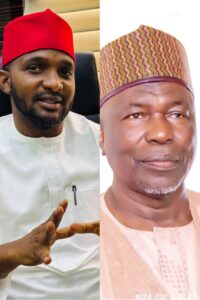
By Rilwan Muhammad
I always make it a point to listen to BBC Hausa service to catch up with the world’s happenings and also listen to their educative programs. Except caught up in engagements that need(ed) my full time and attention, I always sit in the quiet of my room and listen to a BBC Hausa’s program “Ra’ayi Riga” every Friday.
I particularly like it when Ahmad Abba Abdullahi or Badriyya Tijjani Kalarawi anchors the program in their envious journalistic fashion. This, however, isn’t saying that the other anchorpersons don’t have the journalistic flair; they are all good in their own ways, only that we all have varying implicit set of preferences as sons of Adam, so that who or what Mr A likes may not be who or what Mr B may like or have preference to.
Last friday, just like every other Friday, I freed myself up and made to listen to the week’s “Ra’ayi Riga” program. But the tide was swung against that day as another program, “A Fada a Cika”, was featured. The last time I heard the program, it had as its guest the governor of Jigawa state, Alhaji Badaru Abubakar, who was made to go through the rigour of answering the many expertly tailored questions thrown to him by the program’s anchor whose name has slipped my mind.
Having recollected how I enjoyed every bit of the session with governor Badaru in “A Fada a Cika” which lasted for one hour, it wasn’t hard to decide in favour of listening to the program.
And yes, I enjoyed it, albeit couldn’t listen to last word breathed by the guest, the minister of a key sector in Nigeria.
The anchor was Haruna Shehu Tangaza and the guest Engr Sale Mamman, the Minister of Power.
The latter, in response to questions posed by the former, started to solve the mystery of power problem in Nigeria, a situation that many think has a multiplier effect on virtually all the spheres of man in this day and age.
I followed the interview with keen interest as the minister, determined to make clear their administration’s effort in addressing power problem in the country, talked a mile a minute, wading his way through the muddy path of Tangaza’s contorted questions.
There was a tone of alacrity in the minister’s answers that lured me into listening, with my ears pricked up, to him until I could tell a mile off that Mr Mamman was rather prevaricating.
Where I had occasion to disagree to agree with the minister’s assertion was when he, not caring two hoots about the repercussion of his words, said that there is no town in Nigeria that go for 24 hours without enjoying power for some hour(s).
This statement that ridicules our collective senses came, coincidentally, when we were in total blackout for more than 24 hours in my residence.
I was glad when listeners of the program sent in messages informing the minister that they had been in blackout for weeks, others for months.
I remember a time when we would go for days with no “flash of light” in our electric bulbs. The only time we would enjoy power then was when tariff bills were distributed at the end of the month.
While we can’t refuse to acknowledge the efforts being put to end power problem in Nigeria by the present administration, we also can’t see any credence in what Engr has said. It’s because of this reason that I want to tell anyone who has Engr Sale’s ears that we are still witnessing power outage in our own part of the country.
Mr Minister should know that there are still villages that aren’t yet electrified, much less enjoy uninterrupted power supply that even the major Nigerian cities don’t enjoy. He should be told that the failure of power sector affects all other sectors. One reason why companies die a natural death is power issue, one reason why prices of certain commodities skyrocket is power problem, one reason why businesses suffer to achieve the two survival and growth objectives is power problem, and the list goes endlessly.


